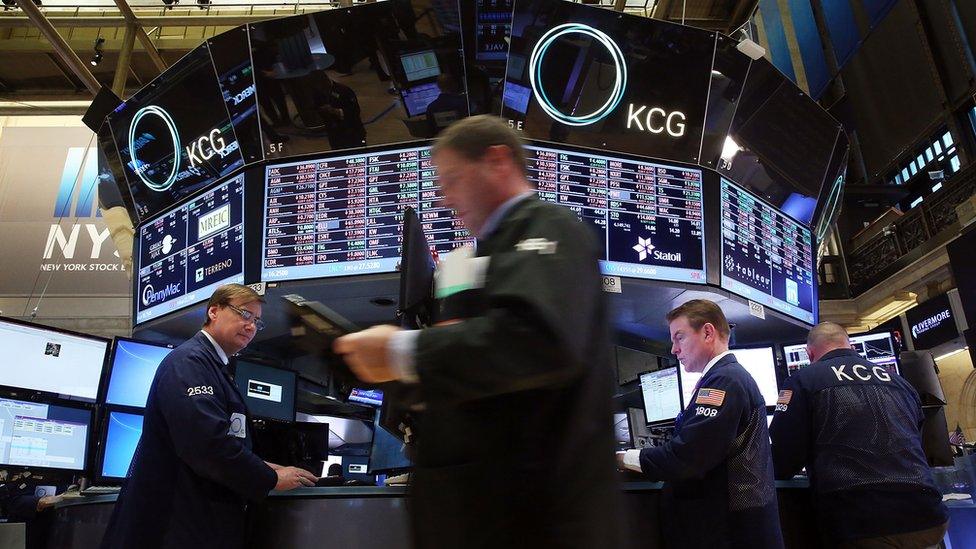US stocks slide amid volatile markets
- Published

Shares on Wall Street closed lower on Monday, following a volatile session for Europe's stock markets.
Analysts said investors remained nervous about slowing global growth, uncertainty about US interest rates and further falls in oil prices.
Greece's financial stocks were down more than 20% as the wider Athens Stock Exchange hit its lowest level since 1991.
US stocks recovered some of their early losses but tech shares were hit hard.
The Dow Jones Industrial Average closed down 177.92, or 1.1%, at 16,027.05.
The Nasdaq Index fell 79.39 points, or 1.82%, to 4,283.75.
That followed sharp losses in Europe, as the FTSE 100 fell 2.7% to 5715.26 and Athens hit a 25-year low.
Brent crude oil futures, a closely watched benchmark, were down 3.4% to $32.92 a barrel.
'Ugly spectre'
On Wall Street, financial stocks were among the worst hit amid concerns that low interest rates in the US, Europe and Japan were hurting bank margins and that the current economic slowdown could lead to a deterioration in credit quality.
Goldman Sachs saw its share price drop 4.6%, while Visa was down 5.2% and JP Morgan 2.1%.
That followed similar falls for bank stocks in Europe, with Deutsche Bank down 9.5%, HSBC down 3%, Commerzbank slumping more than 7% and BNP Paribas falling 4%.
Michael Hewson, chief market analyst at traders CMC Markets UK, said investors in bank stocks were nervous about poor recent results "alongside the ugly spectre of negative interest rates".
'Slowing'
US technology stocks also continued their falls from Friday, with Amazon and Facebook both down 3%.
Investors see tech stocks as particularly exposed to slowing consumer spending, according to Adam Laird, of Hargreaves Lansdown.
"We are still seeing a concern that the world is slowing and perhaps the good times of the last couple of years might not be persisting," he warned.
Central Bank
Analysts also said that investors were focusing more on corporate performance as the Federal Reserve took a more hands-off approach to market movements.
"The Fed has decided not to be the market's babysitter anymore, so investors are having to adjust a monetary-centric market to one that focuses on fundamentals like earnings and revenues," said Jack Ablin, chief investment officer at BMO Private Bank.
Federal Reserve chair Janet Yellen will testify before Congress on Wednesday. She will outline the central bank's outlook for 2016, but is not expected to give a specific time line for a further rate increase.
The Fed raised interest rates marginally in December from levels near zero.
Many observes expect further rate rises to be very slow - if they come at all - given global market conditions.
- Published5 February 2016
